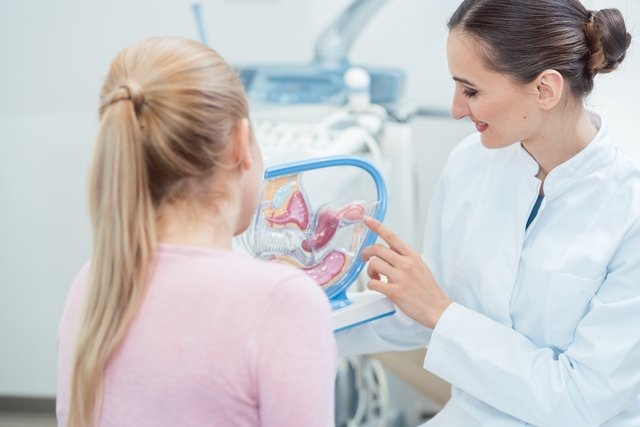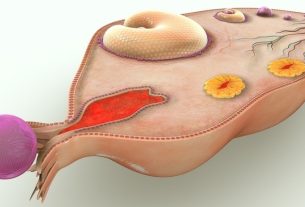Some symptoms of pregnancy before a missed period are sore breasts, pinkish discharge, frequent nausea, cramps, mild abdominal pain or excessive tiredness for no apparent reason, for example.
However, these symptoms can also appear for any other reason or be an indication that the menstrual period is approaching, and are not necessarily a sign of pregnancy.
To confirm whether the symptoms are indeed indicative of pregnancy, it is important that the woman waits for a delay in menstruation and goes to the gynecologist or undergoes urine or blood tests to identify the pregnancy-related hormone, beta-HCG. Learn more about the beta-HCG hormone.

Symptoms of pregnancy before delay
Some of the symptoms that may appear before a missed period and be indicative of pregnancy are:
- Pain in the breasts, which occurs due to increased production of hormones, which leads to the growth of the mammary glands;
- Darkening of the areolas;
- Pinkish discharge, which can occur up to 15 days after fertilization;
- Bloating or abdominal pain;
- Excessive tiredness for no apparent reason;
- Increased frequency of urination;
- Constipation;
- Frequent nausea.
Pregnancy symptoms before menstrual delay are relatively common in most women and arise due to hormonal changes that occur after fertilization, mainly due to the production of progesterone, which increases shortly after ovulation with the aim of preserving the endometrium and allowing the fertilized egg implants in the uterus.
On the other hand, these symptoms can also appear in the premenstrual period, and are not necessarily indicative of pregnancy. Therefore, if these symptoms appear, it is best to wait for the missed period to be confirmed and then carry out tests to confirm the pregnancy. Find out more about the tests that allow you to confirm pregnancy.
Don’t ignore the signs your body is giving you!
How to know if it’s pregnancy
To be more certain that the symptoms presented before the delay are due to pregnancy, it is important that the woman pays attention to her menstrual cycle, to understand whether there is a possibility of having had intercourse during the fertile period.
The fertile period is the time of the menstrual cycle when ovulation occurs and lasts approximately 6 days and occurs 10 to 14 days after the first day of menstruation, and at this stage the woman has a greater chance of getting pregnant. Understand better what the fertile period is.
Fertile period online test
To find out when your fertile period is, simply enter the data into the calculator below. It is important to remember that the calculator’s result is more reliable for women who have a regular menstrual cycle:
In the case of irregular menstrual cycles, it is important to have written down the duration of the longest cycle and the shortest cycle of the last 3 cycles, as this is the most reliable way to calculate the fertile period. See how the fertile period is calculated in irregular cycles.
Pregnancy tests
In addition to calculating the fertile period, you can also take a pharmacy pregnancy test that can be done at home from the first day of your missed period. If the result is negative, it is recommended that the woman repeat the test 3 to 5 days after the first, in order to confirm the result.
However, the best way to know if you are really pregnant is to consult a gynecologist to explain the situation and take a blood test that detects the presence of the hormone beta-HCG, which increases in concentration during pregnancy.
This test, in addition to confirming whether the woman is pregnant, also indicates the week of pregnancy according to the concentration of beta-HCG in the blood. Find out more about the tests that confirm pregnancy.
How many days of a missed period is considered pregnancy
For women with a regular menstrual cycle, a delay of more than 5 days before the expected date for menstruation to begin can be considered a sign of pregnancy, if the woman has had unprotected sexual contact during the fertile period.
However, a delay in menstruation is very normal for most women and does not always indicate pregnancy, and can also occur due to stress, polycystic ovaries or thyroid problems, for example. See the main causes of delayed menstruation.
Bibliography
- PASCUAL, Z. N.; LANGAKER, M. D. IN: STATPEARLS (INTERNET). TREASURE ISLAND (FL): STATPEARLS PUBLISHING. Physiology, Pregnancy. 2023. Available at: <https://www.ncbi.nlm.nih.gov/books/NBK559304/>. Accessed on October 30, 2023
- SOMA-PILLAY, P.; et al. Physiological changes in pregnancy. Cardiovasc J Afr. 27. 2; 89-94, 2016
- KOHLHEPP, L. M.; et al. Physiological changes during pregnancy. Anaesthesist. 67. 5; 383-396, 2018

Sign up for our newsletter and stay up to date with exclusive news
that can transform your routine!
Warning: Undefined array key "title" in /home/storelat/public_html/wp-content/plugins/link-whisper-premium/templates/frontend/related-posts.php on line 12
Warning: Undefined array key "title_tag" in /home/storelat/public_html/wp-content/plugins/link-whisper-premium/templates/frontend/related-posts.php on line 13




